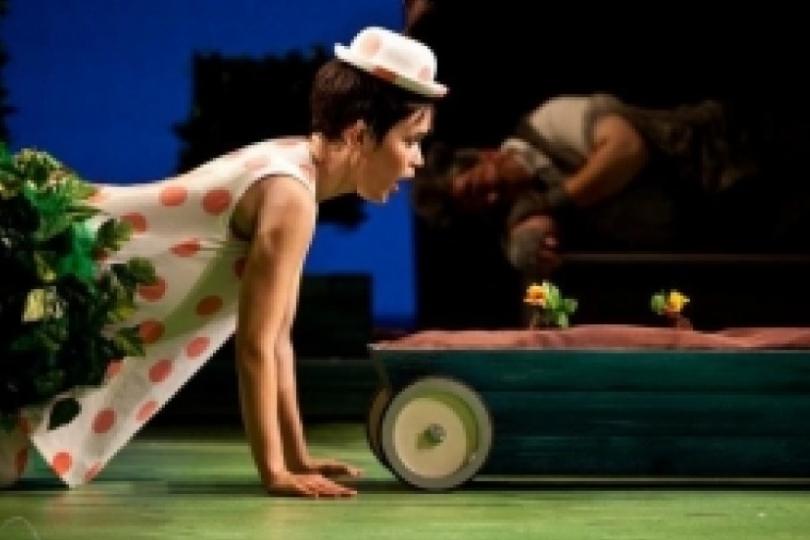Short on pig
Editorial

The Children’s Theatre Company’s production of Mercy Watson To the Rescue is very well-staged and executed. It has an excellent cast of Minnesota theater veterans. Reed Sigmund takes full advantage of many opportunities to perform broad, physical comedy. Wendy Lehr and Elizabeth Griffith are enjoyable in their sweet and sour sister dynamic. Jason Ballweber gives his cat character a charming indifference. Mo Perry and Gerald Drake, as the Watsons, create a believable affection for one another. And Sara Richardson seems to be using every tool she's developed over the course of her career.
But a fundamental change made to the character of Mercy Watson in the adaptation from book to stage keeps the play from fully realizing the wonder and charm of the book series.
In the book series, Mercy Watson the pig doesn’t talk. We get some thought bubbles from her explaining her motivation but never anything other than an oink comes out of her snout. In the stage play, Mercy Watson To the Rescue the pig doesn’t talk, much. In fact, she only says the words “toast” or “no toast.” But in those few simple words she moves from being a pig to a human playing a pig or a human-like pig. And in that small change the character of Mercy Watson loses her simplicity, and the stories lose their charm.
I imagine most people have had the experience of seeing a book they have a strong relationship with adapted for the stage or film and being disappointed. Words on a page let the reader have a pretty big hand in creating the world they’re experiencing. As an adolescent I loved Stephen King’s novel about a gang of kids terrorized by a magical, predatory creature, IT. The book was thrilling and terrifying, particularly because the titular creature’s main weapon was that it could take on the shape of its victim’s worst fear. When IT was adapted into a television miniseries I was excited but ultimately found the adaptation quite disappointing. The television version was still compelling and scary but there was no way to make the character IT as terrifying on screen as the book allowed me to make it in my mind.
The Mercy Watson book series is elemental story telling done beautifully. They’re formulaic by design. Everyone is happy, the pig causes a problem, people get angry or confused, the pig accidentally solves the problem, everyone is happy. The characters are simple and silly and completely charming.
Because Mercy is a pig, there are no expectations of empathy, awareness, or respect for the needs of others. There is confusion and tensions caused by this pig but no one ultimately gets hurt or even stays upset because there are no human expectations placed on the pig. Additionally, the books are written to be accessible to very young children, so they use a very limited vocabulary and largely one-dimensional characters. But the characters are all grounded in the reality of their world on Deckawoo Drive where most people accept the Watson’s affection and treatment of a pig.
By simply giving the pig a word or two she becomes responsible for her actions. When she steals someone else’s food she comes off as a rude child. When she licks a neighbor lady’s face it’s a violation of someone’s personal space. And when she runs away from home she’s a kid acting out for attention not just a hungry pig looking for toast.
And by simply giving the pig a word or two Mr. and Mrs. Watson become not a couple with an endearing affection for their pig but instead the parents of a spoiled brat with blinders so big they appear to maliciously ignore Mercy’s treatment of others.
There’s nothing charming about a character who doesn’t care about anyone. There’s nothing funny about a kid who doesn’t realize her actions impact other people. Many books have been adapted into wonderful plays. Babe, the Sheep Pig is a play staged earlier this year at CTC that was adapted from a novel with a pig main character. But the Babe character in the novel is filled with compassion for others and has a bunch of animals to talk to and interact with. `That compassion, that moral agency moves smoothly from book to stage. You can care about what happens to Babe because Babe cares about what happens to others.
I want to chalk up my disappointment to a personal failure to suspend my disbelief. But I can accept a cartoon drawing of a pig in a book. I also want to chalk up my disappointment to unrealistic expectations. But a wonderful book series by an award winning author providing source material for a play staged by one of the most well respected producers of children’s theater in the country should come with high expectations. Books can and often do translate wonderfully to the stage. And perhaps the Mercy Watson book series is good source material for the unique storytelling elements of theater. But this particular adaptation leaves me wishing Mercy Watson had been left to live on the page.




